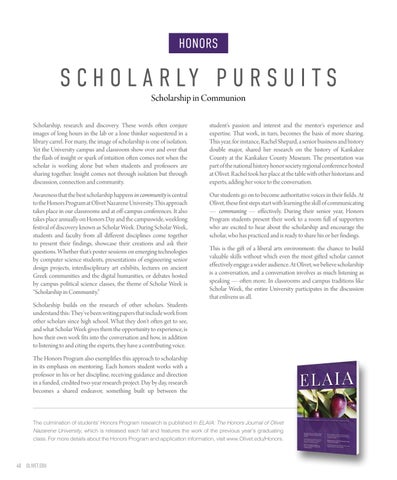HONORS
S C H O L A R LY P U R S U I T S Scholarship in Communion Scholarship, research and discovery. These words often conjure images of long hours in the lab or a lone thinker sequestered in a library carrel. For many, the image of scholarship is one of isolation. Yet the University campus and classroom show over and over that the flash of insight or spark of intuition often comes not when the scholar is working alone but when students and professors are sharing together. Insight comes not through isolation but through discussion, connection and community.
student’s passion and interest and the mentor’s experience and expertise. That work, in turn, becomes the basis of more sharing. This year, for instance, Rachel Shepard, a senior business and history double major, shared her research on the history of Kankakee County at the Kankakee County Museum. The presentation was part of the national history honor society regional conference hosted at Olivet. Rachel took her place at the table with other historians and experts, adding her voice to the conversation.
Awareness that the best scholarship happens in community is central to the Honors Program at Olivet Nazarene University. This approach takes place in our classrooms and at off-campus conferences. It also takes place annually on Honors Day and the campuswide, weeklong festival of discovery known as Scholar Week. During Scholar Week, students and faculty from all different disciplines come together to present their findings, showcase their creations and ask their questions. Whether that’s poster sessions on emerging technologies by computer science students, presentations of engineering senior design projects, interdisciplinary art exhibits, lectures on ancient Greek communities and the digital humanities, or debates hosted by campus political science classes, the theme of Scholar Week is “Scholarship in Community.”
Our students go on to become authoritative voices in their fields. At Olivet, these first steps start with learning the skill of communicating — communing — effectively. During their senior year, Honors Program students present their work to a room full of supporters who are excited to hear about the scholarship and encourage the scholar, who has practiced and is ready to share his or her findings.
Scholarship builds on the research of other scholars. Students understand this: They’ve been writing papers that include work from other scholars since high school. What they don’t often get to see, and what Scholar Week gives them the opportunity to experience, is how their own work fits into the conversation and how, in addition to listening to and citing the experts, they have a contributing voice.
This is the gift of a liberal arts environment: the chance to build valuable skills without which even the most gifted scholar cannot effectively engage a wider audience. At Olivet, we believe scholarship is a conversation, and a conversation involves as much listening as speaking — often more. In classrooms and campus traditions like Scholar Week, the entire University participates in the discussion that enlivens us all.
The Honors Program also exemplifies this approach to scholarship in its emphasis on mentoring. Each honors student works with a professor in his or her discipline, receiving guidance and direction in a funded, credited two-year research project. Day by day, research becomes a shared endeavor, something built up between the
The culmination of students’ Honors Program research is published in ELAIA: The Honors Journal of Olivet Nazarene University, which is released each fall and features the work of the previous year’s graduating
class. For more details about the Honors Program and application information, visit www.Olivet.edu/Honors.
40 OLIVET.EDU
